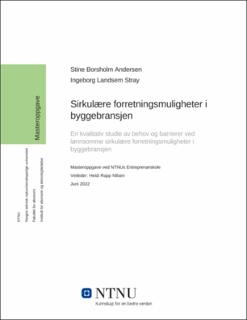| dc.contributor.advisor | Nilsen, Heidi Rapp | |
| dc.contributor.author | Andersen, Stine Borsholm | |
| dc.contributor.author | Stray, Ingeborg Landsem | |
| dc.date.accessioned | 2022-10-07T17:29:55Z | |
| dc.date.available | 2022-10-07T17:29:55Z | |
| dc.date.issued | 2022 | |
| dc.identifier | no.ntnu:inspera:116470872:116749062 | |
| dc.identifier.uri | https://hdl.handle.net/11250/3024640 | |
| dc.description.abstract | Den menneskeskapte klima- og naturkrisen er vår tids største utfordring. Økonomien må innrettes mot å bli mer sirkulær og bærekraftig for å nå klimamålene. Byggebransjen har et stort potensial til å redusere sitt svært høye ressursforbruk ved å erstatte den tradisjonelle lineære økonomien med sirkulær økonomi. En av de største barrierene for implementering av sirkulær økonomi i byggebransjen blir beskrevet som mangel på økonomisk lønnsomhet. Temaet i masteroppgaven er å se på hvilke barrierer byggebransjen må overkomme for å implementere lønnsomme sirkulære forretningsmuligheter. Dette studeres gjennom to forskningsspørsmål:
• Hvordan kan entreprenører i byggebransjen utvikle sirkulære forretningsmuligheter, og hvilke barrierer finnes ved implementering av lønnsomme sirkulære forretningsmuligheter?
• Hvilke barrierer opplever oppstartsbedrifter ved implementering av lønnsomme sirkulære forretningsmuligheter i byggebransjen?
For å besvare forskningsspørsmålene er det benyttet en kvalitativ forskningsmetode. Som en del av forskningsmetoden har vi gjennomført en «multiple» casestudie med to utvalg, entreprenører og oppstartsbedrifter. Data er innhentet gjennom semistrukturerte intervjuer med fire etablerte entreprenører og fem oppstartsbedrifter. Dataen blir først beskrevet for hver case, og deretter analysert i en «cross-case»-analyse.
Funn i masteroppgaven viser at det er et grunnleggende behov for å finne økonomisk lønnsomme forretningsmuligheter for å klare å implementere sirkulær økonomi i byggebransjen. Entreprenørene etterspør en markedsplass for ombruksmaterialer som en sirkulær forretningsmulighet, men ønsker ikke å utvikle den selv. Funn i masteroppgaven viser at det er flere barrierer for å implementere lønnsomme sirkulære forretningsmuligheter, og deler barrierene i kulturelle, økonomiske og regulatoriske. Entreprenørene mener at dagens sirkulære forretningsmuligheter mangler gode økonomiske argumenter, og er avhengig av byggherre for å ta de fordyrende kostnadene. Oppstartsbedriftene mener sirkulær økonomi er et attraktivt forretningsområde, men at et umodent marked skaper utfordringer knyttet til manglende kunnskap, lønnsomhet og reguleringer. Funn viser at bransjen har et stort behov for regulatoriske endringer for å stimulere det sirkulære markedet, og for å gjøre sirkulær økonomi mer lønnsomt. Funn viser derimot ulikheter knyttet til hvilke krav og insentiver som kan stimulere lønnsomheten.
Vi tror at en implementering av lønnsomme sirkulære forretningsmuligheter vil være viktig i møte med det grønne skifte. Masteroppgaven gir et nytt bidrag til litteraturen ved å studere behovet etter sirkulære forretningsmuligheter og barrierer ved implementering av lønnsomme sirkulære forretningsmuligheter. Masteroppgaven gir også et praktisk og forretningsmessig bidrag til etablerte aktører og oppstartsbedrifter som ønsker å satse på nye sirkulære forretningsmuligheter i byggebransjen. For videre forskning er det interessant å se på (1) hvordan oppstartsbedrifter i samarbeid med etablerte aktører kan utvikle lønnsomme sirkulære forretningsmuligheter, (2) hvordan sirkulære forretningsmuligheter påvirker alle aktørene i forsyningskjeden, og (3) kartlegge kostnadsdrivere for sirkulære prosjekter. | |
| dc.description.abstract | The man-made climate and nature crisis is the biggest challenge of our time. The world economy must be geared towards becoming more sustainable and circular in order to achieve the climate goals. The construction industry has great potential to reduce its high consumption of resource by replacing the traditional linear economy with circular economy. One of the major barriers for circular economy in the construction industry is described as the lack of profitability. The topic for this master´s thesis is to examine barriers the construction industry most overcome in order to implement profitable circular business opportunities. This is addressed through two research questions:
• How can contractors in the construction industry develop circular business opportunities, and what barriers exist when implementing profitable circular business opportunities?
• Which barriers do start-up companies experience when implementing profitable circular business opportunities in the construction industry?
The master´s thesis is based on a qualitative research method. To answer the research questions, we have conducted a multiple case study with in two selected segments, contractors and start-up companies. Data was obtained based on semi- structured interviews with four established contractors and five start-up companies. The data are first described for each case, and then analyzed in a cross-case analysis.
Findings from this master´s thesis show that there is a basic need to find profitable business opportunities in order to implement circular economy in the construction industry. Contractors demand a marketplace for reused building materials as a circular business opportunity, but do not want to develop it themselves. Finding in the master´s thesis shows that there are several barriers to implementing profitable circular business opportunities, and divides the barriers into cultural, economic and regulatory. The contractors believe that today´s circular business opportunities lack good financial arguments and are dependent on the clients to bear the extra costs. The start-up companies believe that circular economy is an attractive business area, but an immature market creates challenges related to lack of knowledge, profitability and regulations. This study shows that the industry has a great need for regulatory changes to stimulate the circular marked and make it more profitable. On the other hand, there are differences related to which requirements and incentives that can stimulate profitability.
We believe that the implementation of profitable circular business opportunities will be important to stimulate for the green shift. This master´s thesis makes a new contribution to the literature by studying the need for circular business opportunities and barriers in the implementation of profitable circular business opportunities. This master´s thesis also makes a practical and business contribution to established players and start-up companies who want to invest in new circular business opportunities in the construction industry. For further research, interesting topics to address are; (1) how start-up companies in collaboration with established players can develop profitable circular business opportunities, (2) how circular business opportunities affect all players in the supply chain, and (3) map cost drivers for circular projects. | |
| dc.language | nob | |
| dc.publisher | NTNU | |
| dc.title | Sirkulære forretningsmuligheter i byggebransjen | |
| dc.type | Master thesis | |
